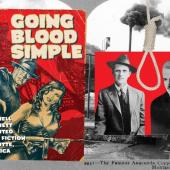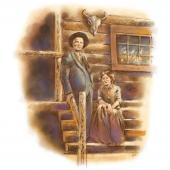Even the Mountains
Super 1 was medium-sized. It had seemed huge to Ruthie as a girl, but now she realized it was smaller by a half than the Safeway in Missoula, or the stores in most towns. A dying breed. With the new Walmart just past Lolo, it was only a matter of time before it was gone. Like the buffalo. Like the passenger train. She smiled to herself. Since turning 30, she’d discovered the capacity to be nostalgic for things she actively despised.
The ice machine, firewood, and a lone rack of discount DVDs lined the wall behind the four checkout lanes. Waiting shoppers clogged the store’s arteries: a barge-like woman carefully inspecting the items in her packed cart before setting them on the conveyor, three teenage girls holding identical baskets of Diet Coke and Twizzlers, a buff guy in a tank top joggling on his toes as if he immediately needed to lift something heavy.
All kinds of new people were moving to the Bitterroot Valley from California, Washington, Oregon.… Outdoorsy types who could work remotely and wanted cheap property under big sky with no zoning restrictions. The valley’s population had nearly doubled in Ruthie’s lifetime. She felt dread and a hard little knot of anger.
She longed to flee. To push her cart through the doors and run with it into the mountains. The world was overflowing. The spaces between farms filling in, parking lots that sprawled across former pastures.
The December afternoon darkness seemed to press in on the windows. Ruthie weighed her options. The far left line was the shortest but the barge woman had already set aside several items in anticipation of price checks or a battle over expired coupons. She looked like the type who rarely went out in public and needed conflict when she did, to justify her lonesome, miserable life. The buff guy was joggling even more rapidly, perhaps preparing to crush the skull of the gray-haired old lady in front of him.

Just go. Ruthie maneuvered the cart on its rickety wheel into the lane behind the teenage girls. All three wore matching volleyball warm-ups. “His parents were upstairs,” one of them said. “Like ten steps away.” Ruthie thought of herself at that age: the feeling she’d had that each moment was of vital importance. Now months passed without her noticing. She worked at the Montana Cafe in Darby and each shift was so like the rest that she measured time only in seasons. How was it winter again? She imagined the girls at practice. Eyes wide, chins upturned, their young arms outspread like wings as they watched the ball sail over the net, holy with anticipation. Bump, set, spike. All she knew of volleyball from her four year annual tradition of watching the Summer Olympics in a state of lackluster interest.
“He was out cold,” the girl went on.
“We weren’t even sure if he was still alive.”
“Madison had to pepper spray him to wake him up. Pepper spray.”
They laughed.
Ruthie squeezed the cart’s handle. The bright-boxed frozen meals stared back at her mockingly. She imagined discovering some great and fearsome strength, bending the handle in half, tearing it free from the child seat, and raising it above her head as a warning to the other, cowering shoppers, the girls in particular. They were watching the shaggy-haired checker mumble to himself as he ran items across the scanner. They hadn’t even glanced back to note that Ruthie was there, becoming invisible as she aged, disappearing like the open spaces in the foothills.
The sliding glass doors past the firewood hissed open and a short, dirty man wearing green fatigues and a tattered brown sweatshirt stumbled into the store. His hair was dreaded into clumps. He stopped in the bright light and looked up, as if surprised to find people in a place he’d expected to be abandoned. His face was so wrinkled and leathery it took Ruthie a moment to find the features: sunken puckered lips, bent nose, and bright blue, twitching eyes. He looked like all the other vagrants who gathered on the shoulder of the highway trying to hitch a ride over Lost Trail Pass.
“Hey,” the man said. His voice rose to address the store. “Hey!” He took three more steps and stopped in front of a table of discount cupcakes. He squinted at the red Christmas frosting, then turned to face the waiting customers. “You better watch out.”
He sucked in a raspy breath, gathering his strength, and Ruthie felt a jab of fear in her gut. Was this a shooter? A stabber? Just that morning she’d read about three children stabbed in an Oklahoma elementary school. Not to mention Columbine, Sandy Hook, Umpqua. But she’d never heard of a massacre in a grocery store. Was this a new breed? Would the pathetic image of her body pitched forward over a cart full of frozen broccoli fettuccine and chicken parmesan come to represent the next step in American decline? She cursed herself for leaving her pistol in the truck.
“It’s coming,” the man said. “I’ve seen it. Aisle five, the reaper. Do you even know? I’m from here.” He stamped his foot. “Right here. And all you…you…” He paused, his lips twisting as he reached for the word. “Tourists. You come here and it’s coming. I’ve seen it. I’ve heard it.”
A blue-vested manager appeared in the produce between the potato bin and the onion bin. Brown-haired, pale, and over-young, she approached slowly, clearly hoping the man would disappear—be sucked back into the vast, mysterious sewer of the Twenty-First Century.
“Sir,” she said.
“This used to be a lake!” the man went on. “You don’t even know.
A lake of water, and then a lake of fire!”
“Excuse me, sir,” the manager said again, and reached out to touch the man’s shoulder.
As soon as her fingers were an inch from his sweatshirt, an internal sensor tripped in his head and he swung around and smacked her arm away. The manager shrieked and the man stumbled back as though stung, a stream of unintelligible invectives issuing from his mouth. Ruthie and the other customers watched in stunned, motionless silence.
Though it had been a lake once, Ruthie knew. One of the biggest in the world….
Then the muscular man sprang into action: tossing his basket onto the conveyor, sprinting across the linoleum, and grabbing the back of the man’s sweatshirt with both fists. The man screamed, trying to twist free, and the muscular man swung him roughly to the floor. He planted his fists into the man’s dirty shoulder blades, pivoted neatly, and drove his knee into the small of his back, pinning him. Then he looked up, sweaty and proud, like a golden retriever who’s brought home a squirrel in its jaws without knowing what to do with it.
Ruthie and the rest of the customers answered with shocked eyes.
The homeless man flailed and shouted, then went still.
A hush fell over the Super 1. Ruthie heard the hum of the ice machine, the distant hiss of produce misters. The teenage girls leaned close together, their eyes wide. The bright, frozen tableau of the prostrate man, the muscular joggler, the stunned manager, and the huddled girls struck Ruthie briefly as beautiful, a portrait of humanity awash in the modern world. She thought of a line she’d read in a photography book she’d bought on a whim years before. “It’s just light reflecting off surfaces.”
Just light…. The thought drifted through Ruthie’s mind. They would come to the valley, and then they would go. As the lake had. As would she. As would even the mountains.












Leave a Comment Here